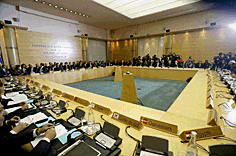
Typical street scene in Santa Ana, El Salvador. (Photo: iStock)
IMF Survey: IMF Works on Lebanon Postconflict Assistance
January 29, 2007
- Substantial economic setbacks followed 2006 war
- Massive displacement of population, exodus of professionals
- Reform program objective is services-oriented regional center
The IMF is working with Lebanese authorities to assemble an Emergency Post-Conflict Assistance (EPCA) program.

Donors pledge: International Conference for Support to Lebanon in Paris at which Lebanon asked for financial aid (Sichov/SIPA)
REBUILDING AFTER WAR
The aim is to support the strife-torn nation's efforts to deal with its massive debt, rebuild and reform its economy, and undertake sound macroeconomic policies to maintain financial stability.
The IMF's effort comes as major donor countries pledged on January 25 in Paris to provide about $7.6 billion in aid to help Lebanon rebuild following a month-long war last year between the Lebanese group Hezbollah and Israel, fought on Lebanese soil.
Under the EPCA program, the IMF works closely with donor organizations, such as the World Bank, and donor countries to provide technical assistance, economic policy advice, and financial assistance.
The 2006 war led to a substantial setback on the economic front. According to official estimates, infrastructure damage was around $2.8 billion. Real GDP, which was expected to grow by 5-6 percent in 2006, is estimated to have contracted by around 5 percent, which implies a loss of income of over $2 billion. Much productive capacity has been lost, and there has been a massive displacement of the population, including the exodus of many professionals.
Mohsin S. Khan, Director of the IMF's Middle East and Central Asia Department, said the package would help Lebanon "significantly in implementing a comprehensive five-year reform program. Provided politics does not derail it, the program should enable Lebanon to develop into an efficient and dynamic services-oriented regional center. The donor financing will be phased over five years based on progress in completing the reforms."







